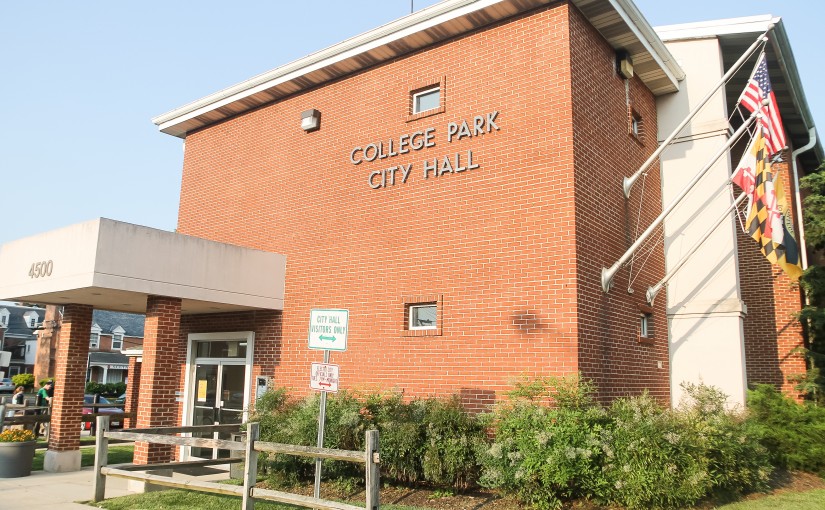College Park residents will no longer be required to provide an excuse when requesting an absentee ballot to vote in city elections, thanks to a bill signed into law Tuesday by Maryland Gov. Larry Hogan.
The bill, which was sponsored by Sen. Will Smith (D-Montgomery), prohibits municipalities from requiring individuals to provide excuses for absentee ballots. It will go into effect June 1.
While Maryland state law already provides for no-excuse absentee voting, College Park was one of the few cities in the state that required a reason for an absentee ballot.
Previously, College Park voters were required to provide one of five excuses before voting by absentee ballot: absence from the city, inability to get to the polls due to serious illness, physical disability or accident on election day, attending a higher education institution outside the city, being confined or restricted to an institution or death or serious illness in the voter’s immediate family.
College Park Mayor Patrick Wojahn said the city will prepare between now and the city’s budget meetings — which Wojahn said will happen next year — for the possible increase in absentee ballots by exploring how other municipalities currently process their ballots, and how the ballots will impact the fiscal 2020 budget.
“It’s good to promote democracy and promote participation from the student body and all College Park residents,” Wojahn said. “I’m hoping that it will increase the level of engagement from all residents.”
The bill was backed by the University of Maryland’s Student Government Association. Chris Keosian, the SGA’s former director of city affairs, said he pursued the bill after encountering opposition from city officials towards amending the city’s policy.
The SGA voted Jan. 31 to endorse a College Park City Council measure to allow voters to cast absentee ballots without an excuse. Yet the council did not move forward with the measure at its Feb. 6 work session, after city officials raised concerns about budgetary constraints and potential for fraud.
Keosian, a senior government and politics major, was joined in backing the effort alongside former SGA governmental affairs director Mihir Khetarpal and former SGA civic engagement director Georgie Jones. The bill, which was first introduced in 2014, was then sponsored by former Del. Ron George (R-Anne Arundel), but failed to make it out of committee.
Jones, a senior government and politics major, said it was “surreal” to see years of student work that began before she was part of the organization become law. Keosian, the city council’s outgoing student liaison, marveled at the legislation’s progression over the last several months.
“I don’t think in July, when we first talked about changing the city policy, that we would think next May we would be at the state house for a bill signing,” he said.
The new law will not change how collecting absentee ballots are processed, said Jack Robson, chief of the city’s Board of Elections Supervisors. Robson said more resources will be needed to manage the influx of absentee ballots, but that the city “will be able to handle whatever we get.”
“We must comply, we must allow people to vote by absentee ballot,” he said.
Khetarpal said he’s excited to see how the new law will affect future municipal elections, emphasizing the value of the change for students.
“Right now for municipal elections, polling places can be far depending on your district and with classes, internships and family needs this can be a problem,” he said. “This just allows more people to make their voices heard at a level of government where offices are decided on small margins of votes.”
But Robson questioned why students would need no-excuse absentee ballots, when many College Park residents are able to vote without them.
[Read more: College Park City Council debates making absentee voting more flexible for UMD students]
“You have people who vote throughout the day, who have jobs that they have to get to either in the morning or in the afternoon, and somehow are able to make time to get to the poll,” he said. “Maybe there are some [students] out there who have a complete day, where they can’t get to the poll between 7 a.m. and 8 p.m. and spend the approximately 20 minutes to vote.”
Keosian said “this is about more than students voting.”
“This is about anyone — a student or a resident of College Park — having the ability to request an absentee ballot because they cannot make it to the polls,” he said. “More people voting is a win no matter what.”
For College Park, 2017 was the second straight election in which all races — for the council seats, and the mayoral position — were contested. The city’s next municipal elections will be held on Nov. 5, 2019.
Jones said General Assembly members lead most of the bills the SGA lobbies for, but in this instance, “if felt like we were kind of steering.”
“I think it goes to show the power of a team and to not let people tell you something is a bad idea,” Keosian said.



